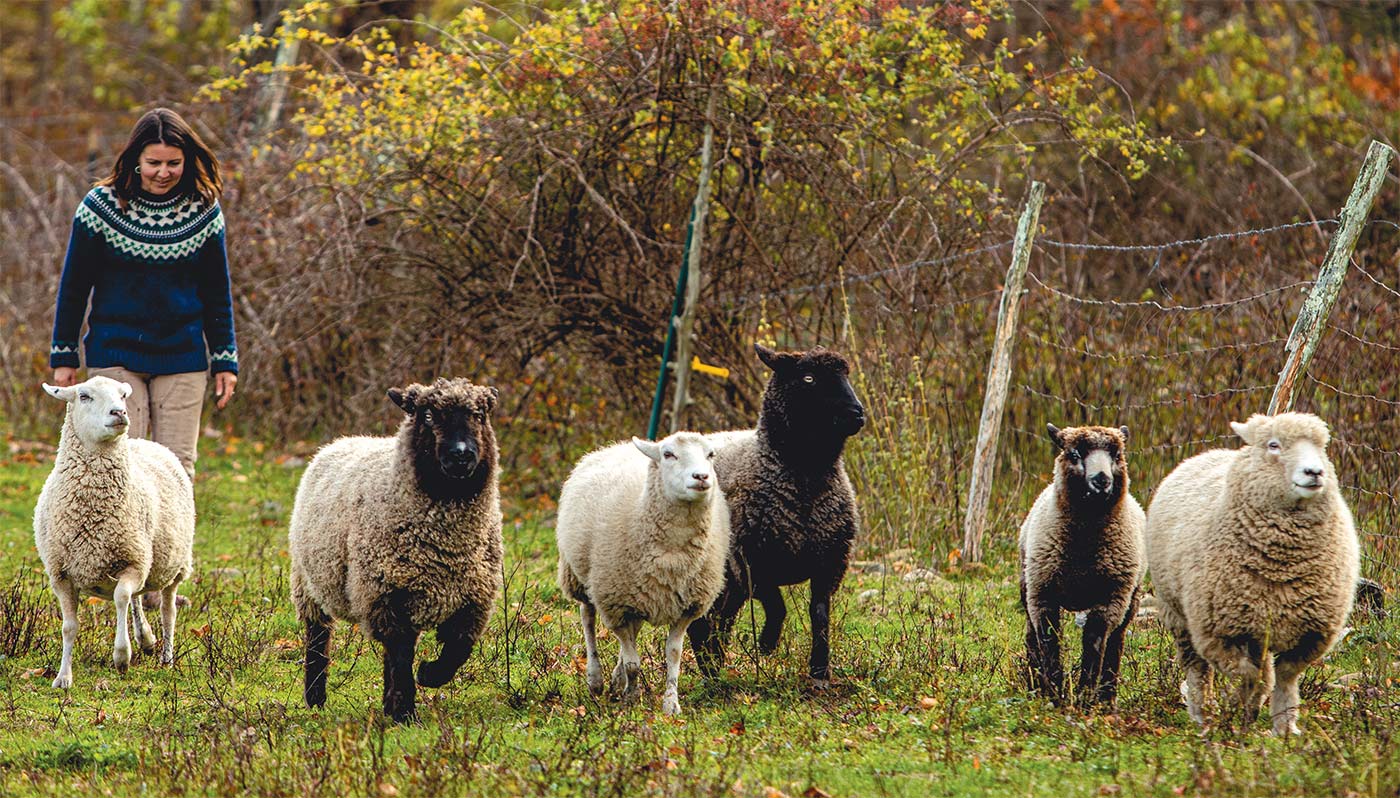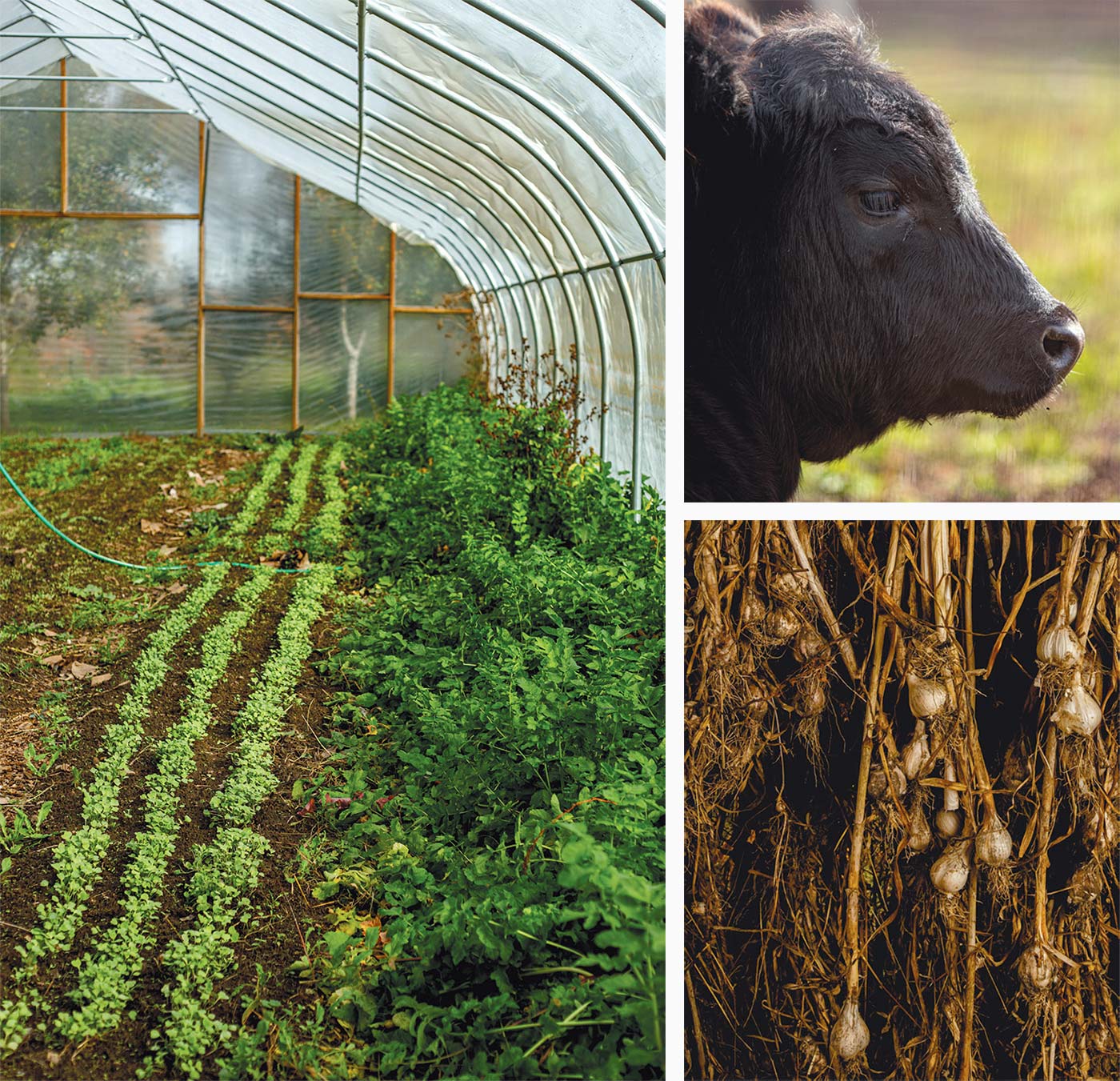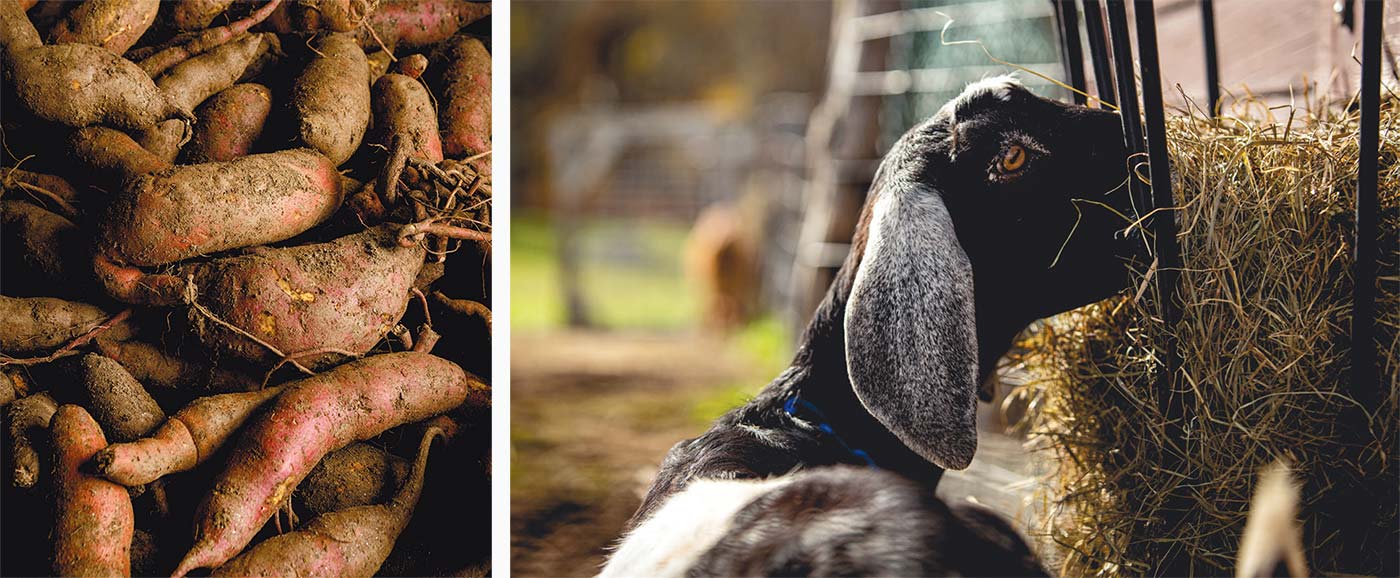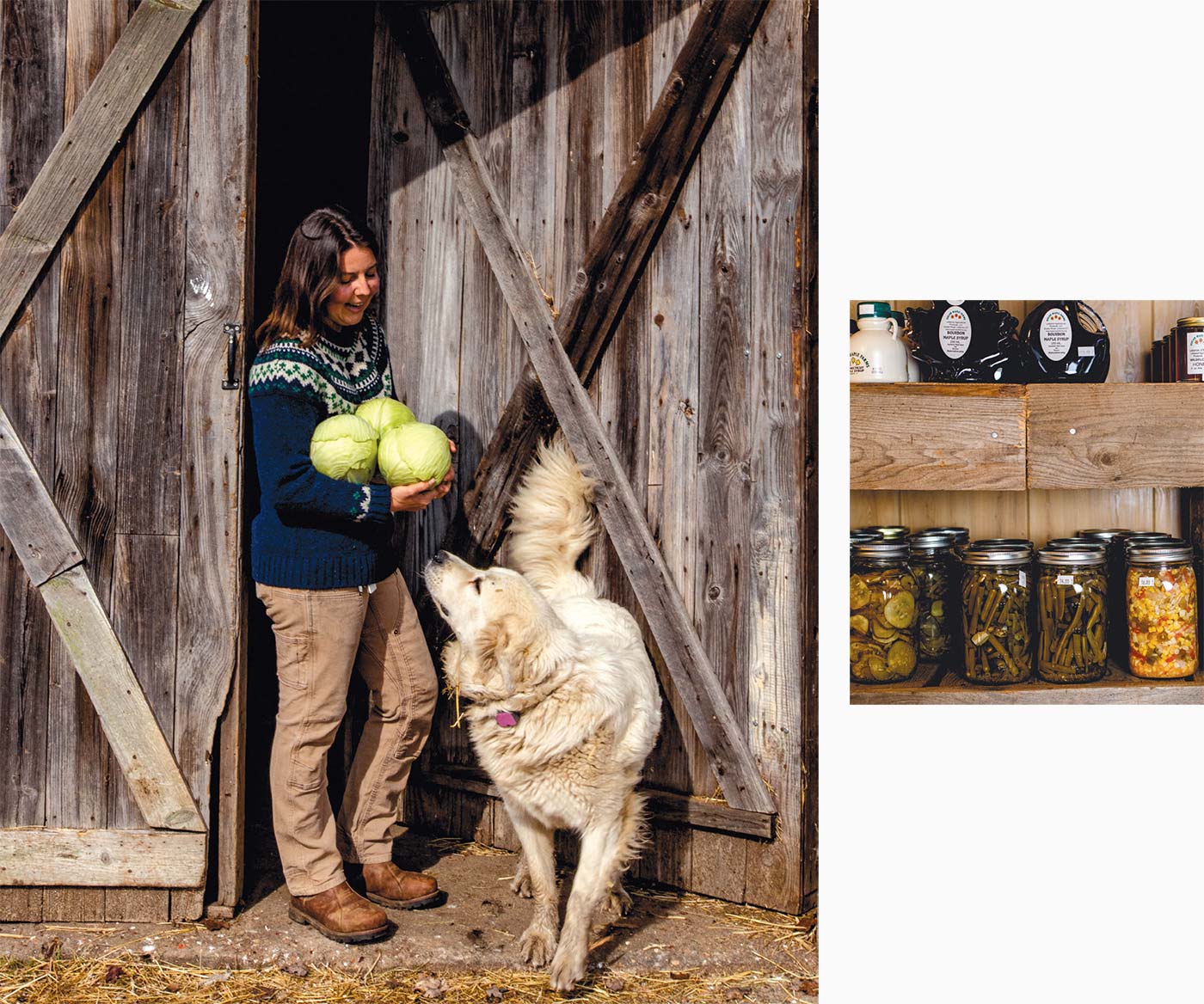What Happens on a Connecticut Farm in Winter?

What happens on a Connecticut farm in winter? You might think rest … growing season is over; the harvest is in. Perennials are tucked under blankets of mulch. Critters are cozy in thick winter coats. For many farmers, winter is time for cleaning, repairing, sharpening tools, planning, buying seeds, bookkeeping. For Jess Stone at Cold Spring Farm, there’s all that and much, much more. There’s no rest for the weary for a farmer with Jess’s energy and vision. And she’s fine with that.
Cold Spring Farm is a spacious green dome of open fields fringed with forest. Three hundred acres atop a broad hill east of Lake Hayward in Colchester, the land has been farmed for over 300 years. Until Jess and her husband Jeff Savitsky arrived in 2012, the property had languished from years of neglect.
The farm’s beating heart is a cluster of buildings that encircle an ancient red maple. A gravel drive hugs the tree and an adjacent picnic area, bordered by native perennials. Buildings surround that central space like petals of a sunflower: A classic white farmhouse with front porch and burgundy metal roof. The Harvest Barn, a timber frame building raised traditionally in one day by community members. A massive, old gambrel-roofed barn with animal stalls, a workshop, hayloft, storage space and a cluttered but functional commercial kitchen. To the side and behind are animal pens and pastures. A hangar-like metal structure stores machinery. A series of translucent plastic-covered greenhouses (high tunnels) stand on the periphery. A small, white farm stand building marks the end and beginning of the gravel loop.
High tunnels, mulches, fabrics, passive solar heat, and simple but clever technology such as using a cushion of air as insulation allow many New England farms to grow produce year-round. Cold Spring Farm’s market never closes for the season. “It took years to get people to understand we are open every day of the year. They have no excuse for not coming!” Jess says, laughing. “It’s a big culture shift in Connecticut. Farmers are hopping on the bandwagon of growing year-round in high tunnels. That knowledge hasn’t reached the whole consumer base yet, though. People are surprised they can get local produce year-round.”

Upper left to right: A young calf at pasture; a view inside a long house used in fall and winter; garlic hanging to dry in a shed; purple sweet potatoes; and a goat eating hay in one of the paddocks
“We’ve been growing in winter a long time but on the scale to sell to the public only the last three or four years,” says Jess. Even in winter, you can buy potatoes, sweet potatoes, beets, parsnips, turnips, horseradish, winter squash, fresh herbs, radishes, and hearty greens like kale and Swiss chard from their farm stand. A wall of rustic wood shelves holds canned goods, made fresh on the farm. They put up 4,500 every year. Glass jars shine with botanic color: pickles, relish, dilly beans, tomato sauce, fruit, corn salsa, plus hot sauces, jams, even dried beans, and herbs.
A second small room houses glass-front cooler and freezer cases, with frozen meat, eggs, baked goods, dairy products and prepared to-go meals. Another freezer holds bread, pizza dough, and naan, all made from scratch on-site. You can even buy soap, laundry detergent, and other products that Jess has carefully curated to meet her high standards and values. By design, the farm stand is a mini grocery store, offering all the essentials. “Going to a grocery store is so confusing for people. All the things you should be eating are in this space,” Jess says. “We even offer recipes. You don’t need to buy pizza. Make your own--we have all the ingredients right here.”
Like many modern New England farmers, Jess knows thriving means diversifying. Cold Spring Farm is home to 900 to 1,500 heritage breed animals, depending on the time of year. “Chickens, ducks, geese, peacocks, cows, pigs, sheep, goats, dogs, cats, kids…. They’re animals too,” Jess jokes. Cows and sheep roam wide grassy pastures. Goats climb atop wooden structures, playing king of the mountain. A sleepy mound of pigs wiggles their ears in a large, muddy pen, wondering if it’s worth it to get up and see if we have snacks. Poultry of every size, shape, and color scratch in the dirt and scramble around a large yard fenced on all sides, including the top to deter hawks. Peacocks roam freely and roost in the barn, exotic tails draped down humble hay bales. Two huge but amiable white Pyrenees Mountain dogs guard them all from coyotes and other predators.
“Someone said to me once, ‘I think this food has drugs in it--what’s in it? Why is it so good?’ Because it’s real food.” —Jess Stone

Fourteen commercial freezers store meat for sale throughout the year, but Cold Spring Farm also uses their animal products in their own prepared food, available at events, as to-go meals and from a brand-new food truck. Although not raised in a farm family, Jess has had a passion for growing and cooking food since childhood. “I started my first garden at age seven. I started buying and making my own food at age twelve. When babysitting money didn’t cover it, I knew I needed to have my own food source. Every year, my gardens got bigger and better.” She started cooking for farmer’s markets eight years ago when food vendors were inconsistent and unreliable. She knew that to get people to stay, they needed a prepared food source.
Their new food truck, “The Farm Kitchen,” is shiny black, decorated with farm animal illustrations by a local artist. “Our menu meets people where they’re at and gets them to eat quality food,” says Jess. “I make burgers, breakfast sandwiches, hot dogs, and kielbasa with my beef and pork. Once they taste it, they’ll never want a fake hot dog again.” They also use their own baked goods plus condiments and sides made from their farm produce. “Someone said to me once, ‘I think this food has drugs in it--what’s in it? Why is it so good?’ Because it’s real food.”
In addition to the on-site farm stand open 365 and the food truck (Jess was hauling it to cook at a local brewery that evening), Cold Spring Farm hosts a Winter Market. This offers everything you’d find at a summer farmer’s market--baked goods, produce, meat, and products by local makers. Held in the Harvest Barn—heated by a hulking 1800s cast iron wood stove—Winter Market is held on-site once in November and December plus pop-ups in January, February, and March at other places. “My motivation is to promote other farms, to generate a local economy,” says Jess. “You can’t expect someone to hand it to you. You have to build it. You have to teach others to do it. It obviously takes more than us to be effective. For us, it’s about providing opportunity.” Cold Spring Farm also offers a CSA, meal kits, a delivery service, canning and harvest parties, farm education for school groups, community potlucks, and other events all year long.
As we tour the property, Jess sketches out coming changes; her hands move through the air, drawing the design in her mind. “When we bought it, this place was trashed. I have a vision for a lot of things, but it’s often hard to see,” she says. “It will look totally different in the next few years. It’s rewarding and exciting but a never-ending process, a constant hustle. No time for naps. I’m getting a break right now with this interview, so thank you.”

Left: Jess carrying freshly harvested cabbage from the barn with her Great Pyrenees, Seven. Right: Dilly beans and other products made and sold at the farm stand
The main barn will be refaced but honor the original 1930s structure. The attached commercial kitchen will be renovated and enlarged. Several new structures will be built: A Livestock Barn the length of a football field. A Living Barn, for farm stays, interns, and other helpers. A two-story Production Barn will house an apothecary, a lab with benches and microscopes for study and teaching, an office, community space, temperature-controlled seed storage, walk-in coolers, dry goods, and crop storage. Everything will have same color, roof line, and clean-lined structure using barn board. Jess’s vision for the farm is both vast yet particular and ambitious but meticulously planned.
Over the years, she has mastered grant writing, which helps finance renovation and expansion. It is a massive, expensive process and effort … in addition to day-to-day farm operations. “Eventually I want a slaughterhouse and smokehouse, make it a co-op with other farmers, but we need to get infrastructure fixed first. It’s been tear down, fix, tear down, fix, rebuild, rebuild. It’s hard when you can’t count on income because we spend it on the farm. So winter is grant writing time. We had a deadline November 15th. They think it’s a good time for farmers but that’s still farm season. It never ends.”
At Cold Spring Farm, Jess is not just growing food, raising livestock, or renovating a farm. She is nurturing a culture she hopes will catch on with other local farmers. “What I really want to see is farmers working together. If you collaborate and network, you’ll be more successful. You have to build the culture. ‘Put the culture back in agriculture’-- that’s been my line for the last 25 years.”
A farm-centric culture also depends on consumers. “People want convenience,” she admits. “In May, they ask for sweet corn because they can get it at Stop & Shop. Here it’s barely planted by May. It’s an education. We’re farming but we’re constantly teaching. If we’re not teaching, there will be no more farming.”
Jess wants to inspire farmers and consumers as well as students. “Bring them to the farm; that’s where you make a bigger connection.” Next year—if a grant comes through--they will teach over 650 children from Middletown to grow their own crop from start to finish, then take it home and cook with it. “It’s about more than convenience. It’s an investment in all our futures. If you want farms to stay around, you have to support them all the time.”
At Cold Spring Farm, Jess, her husband Jeff, and their employees are raising, growing, cooking, and selling healthy food year-round. They are also building a culture of agriculture: a vibrant community of farmers, consumers and students of all ages who understand how important taking good care of the soil, plants, and animals is for our good health and well-being. So much for a Winter break!
- Cold Spring Farm is located at 46 Town Road in Colchester.
coldspringfarmct.com
@coldspringfarmct




